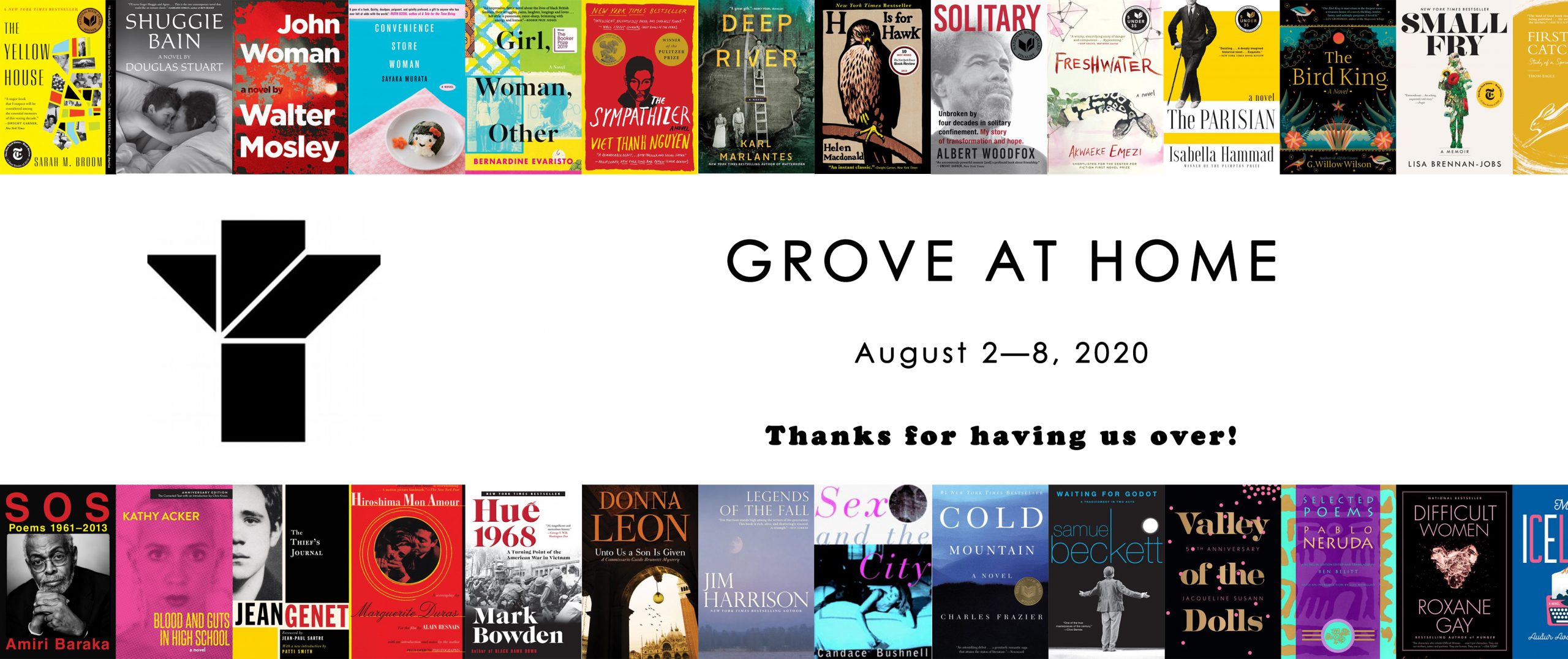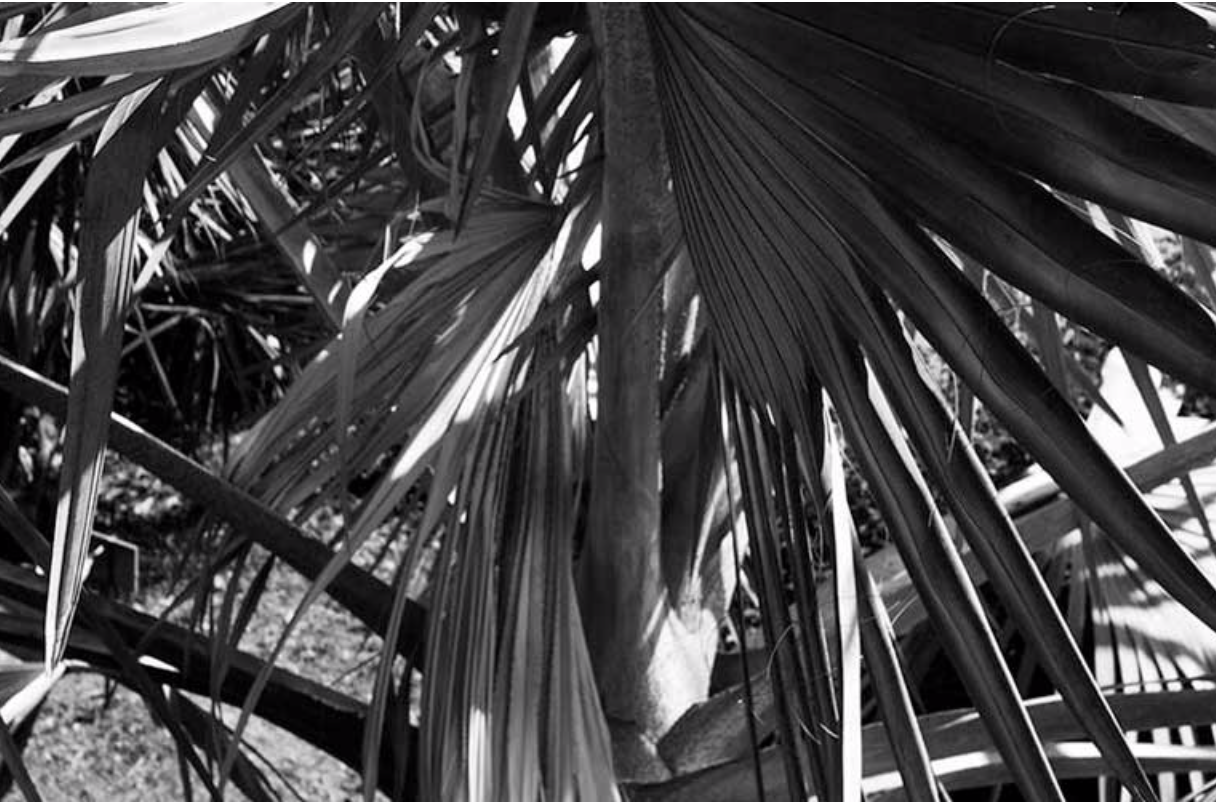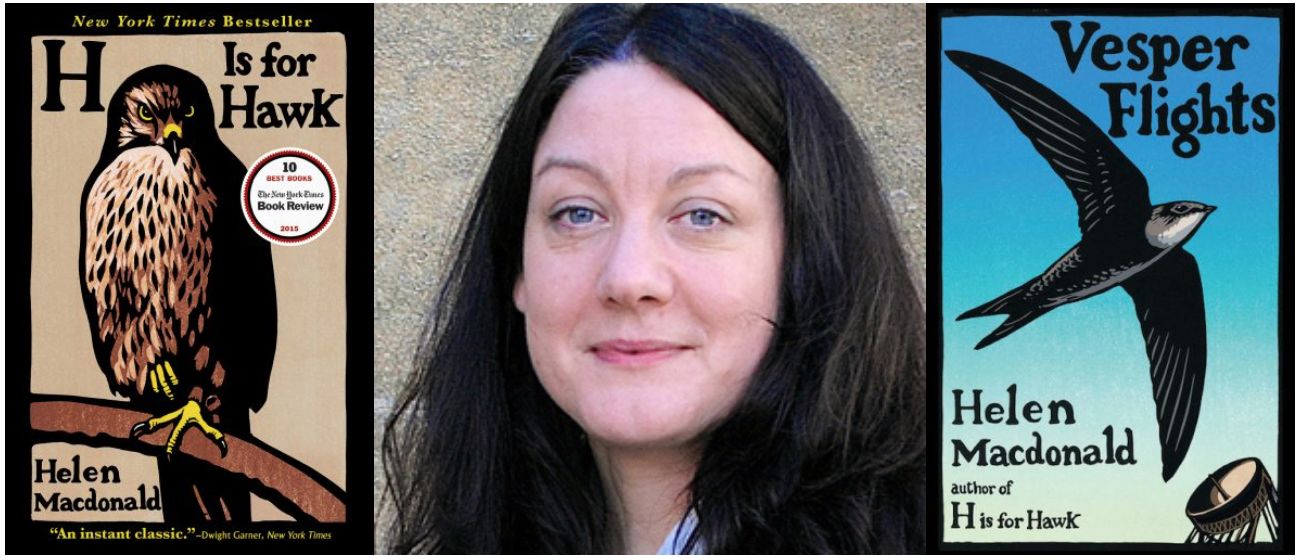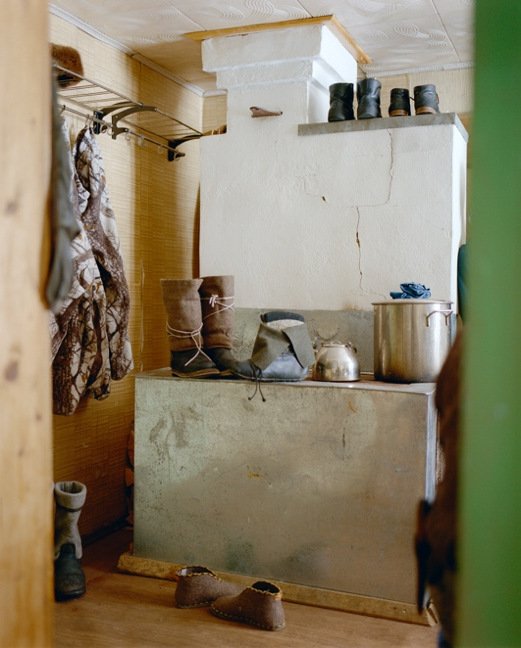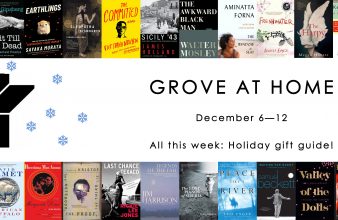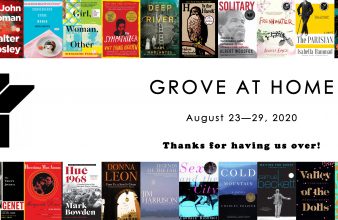News Room
Welcome to Grove at Home!
Every weekday, from now until we’re all out of the house again, we’ll be sharing a couple of links — some fresh, some from the vault — to say hi, remind you to keep reading, and let you know what’s on our minds.
Friday, August 7
Kenzaburo Oe on the bombings of Nagasaki and Hiroshima
This week marks the seventy-fifth anniversary of the use of nuclear weapons against the Japanese cities of Hiroshima (August 6) and Nagasaki (August 9). These events remain the only-ever use of nuclear weapons in armed conflict, and have been one of the major themes to which Japanese Nobel laureate Kenzaburo Oe, ten years old at the time at the time of the bombings, frequently returns in his writing. Oe’s commendation from the Swedish academy notes how his work “with poetic force creates an imagined world where life and myth condense to form a disconcerting picture of the human predicament today” — and this is an apt description of the power and moral clarity Oe brought to Democracy Now!, when he appeared on the show five years ago to discuss the bombings on their seventieth anniversary. Using the Japanese term for survivors of the devastation, Oe says, “We must follow the wishes and the will of hibakusha, and not betray them.”
Wondering what the best book of 1952 was? Sandra Newman’s got you covered.
When Granta magazine asked The Heavens author Sandra Newman to list her favorite book from the year 1952, she came up with a humdinger: Amos Tutuola’s legendary The Palm-Wine Drinkard, a novel justly famous for its melding of Yoruban oral traditions with the conventions of the English-language novel, telling the story of an imbiber so committed to his drink of choice that, when his palm-wine tapster dies, he ventures into the realm of the dead to bring him back. Newman, whose own writing often straddles a line between realism and fantasia, is a perfect voice for appreciations of Tutuola’s style — which, as she notes, continues to fuel divergent readings, nearly seventy years after the fact.
“The plot is full of surreal wit; in a typical episode, the drinkard and his wife find a colossal white tree in the bush, which they enter through a door. They would normally find this terrifying, but ‘before we entered inside the white tree, we had “sold our death” to somebody at the door for the sum of £70: 18: 6d and “lent our fear” to somebody at the door as well on interest of £3: 10: 0d per month, so we did not care about death and we did not fear again.’” Continue reading…
“Poets, visionaries: the realists of a larger reality”
This week — any week — is a good opportunity to revisit Ursula K. Le Guin’s astonishing speech as she accepted the National Book Award in 2014. “Any human power can be resisted and changed by human beings,” Le Guin said. “Resistance and change often begin in art, and very often in our art — the art of words.” Her words have certainly not lost an ounce of their power in the years since she offered them.
Thursday, August 6
“We’re talking Beirut here, where anything can happen and everything has”
Today, as the world continues to look to Beirut, our eyes draped in bewildered sadness, we have at least the benefit of a stirring, stinging Washington Post op-ed written by one of the most gifted psalmists of that city, the wonderful Rabih Alameddine. In his novel An Unnecessary Woman, Rabih offers one of the tenderest, most lyrically affectionate descriptions perhaps ever written of a city by one of its denizens: “Beirut is the Elizabeth Taylor of cities: insane, beautiful, falling apart, aging, and forever drama laden. She’ll also marry any infatuated suitor who promises to make her life more comfortable, no matter how inappropriate he is.” In the Post, Rabih talks about this week’s devastating explosion at the city’s harbor, collecting his sadness and fatigue into rage.
“I was talking to my mother when I heard the explosion. The shaking happened first, followed by the blast. We couldn’t tell what it was, but it felt worse than any car bomb, any missile, anything that occurred during the 15-year civil war. Practically every window in the city was blown out, doors blown off, cars crushed. The Lebanese did not need to be told that there would be deaths and thousands of injuries.” Continue reading…
Today, we’re also thinking about the wonderful Andy Warhol on what would have been his ninety-second birthday. Undeniably one of the most dynamic, influential, and recognizable American artists of the twentieth century, Warhol was both an intellectual who left behind a memorable body intuitions and pronouncements (“In the future, everyone will be world-famous for fifteen minutes”) and a visionary who permanently changed Western notions about aesthetics, creativity authorship, and more. In this utterly remarkable footage, Warhol and his legendary protégée, muse, and comrade Edie Sedgwick show up — where else? — on a 1965 episode of The Merv Griffin Show, to discuss underground cinema, superstardom, how they met, and more. Sedgwick, just twenty-two years old, does… most of the talking. This is incredible.
Andy Warhol eats a hamburger
No reminiscence of Andy Warhol would be complete without this footage of him eating a Burger King hamburger, captured in the early 80s by Danish film legend Jørgen Leth. It’s understated, and — in its subtle appreciation of the fast food meal qua artistic readymade, its elegant irony, its exploration of the effects of fame and recognizability, the disorientation it works by being riveting while asymptotically approaching boredom — it’s classic Warhol.
https://www.youtube.com/watch?v=5LDHSBVZpzc
Wednesday, August 5
Allan J. Lichtman knows who will win the presidential election
When nearly all the pundits and pollsters called the 2016 presidential election wrong, one man — American University history professor Allan J. Lichtman — called it right. In fact, Lichtman, using a system of his own device called “keys to the White House,” has accurately called every U.S. presidential election for the past forty years. In a video posted this morning by the New York Times, Lichtman introduces himself (and a colorful personal history that includes winning four cars on “Tic Tac Dough”), and then breaks down the current state of the 2020 election, declaring his prediction for the outcome. Bear in mind as you watch: he’s never been wrong.
Helen Macdonald on the birds that never come down
Later this month, we’ll finally get to publish Vesper Flights, the brand-new essay collection from H is for Hawk author Helen Macdonald. It’s a remarkable collection of essays exploring the natural world and its complex borders with the human (and it’s available, right now, for pre-order: click the retail links here). In an excerpt from the book recently published by the New York Times Magazine, Helen writes gorgeously about swifts, the small birds that “seem to me the closest things to aliens on Earth,” and that “unlike all other birds I knew as a child… never descended to the ground.” Read this at once.
“I found a dead common swift once, a husk of a bird under a bridge over the River Thames, where sunlight from the water cast bright scribbles on the arches above. I picked it up, held it in my palm, saw the dust in its feathers, its wings crossed like dull blades, its eyes tightly closed, and realized that I didn’t know what to do. This was a surprise. Encouraged by books, I’d always been the type of Gothic amateur naturalist who preserved interesting bits of the dead. I cleaned and polished fox skulls; disarticulated, dried and kept the wings of roadkill birds. But I knew, looking at the swift, that I could not do anything like that to it. The bird was suffused with a kind of seriousness very akin to holiness. I didn’t want to leave it there, so I took it home, swaddled it in a towel and tucked it in the freezer.” Continue reading…
“Oh my God, I need to save the world — I can’t sleep!”: Ada Calhoun on Tamron Hall
It’s a thought that’s occurred to countless Generation X women: I’ve got a family, a good career, how can I be so miserable? It’s a thought that occurred to bestselling author Ada Calhoun, and she did something about it — start talking to other women entering mid-life, while also delving into research questions about trends in family, employment, personal finance, and much more. Gradually, a picture emerged of a new crisis being faced by Gen X women — one that almost no one was talking about. So Calhoun did something revolutionary: she started to talking about it. She even wrote a book about it — Why We Can’t Sleep, named a New York Times editors’ choice. Earlier this year, Ada went on the Tamron Hall Show to talk about the book, the process of writing it, and, most of all, the new midlife crisis so many women are facing — and so few are talking about.
Tuesday, August 4
John Oliver would like us all to learn some history
This week, on his Sunday night comedy news show Last Week Tonight, John Oliver talked about something each of lives with every day: history. One thing all of us, no matter our political stripe, can agree on is that history is not always pleasing. And one of several examples Oliver raised to make his point was a passage from Wilmington’s Lie, Pulitzer Prize-winner David Zucchino’s astonishing and harrowing account of the bloody white supremacist uprising that in 1898 overthrew the elected government of Wilmington, North Carolina — then the state’s capital and largest city. It remains, as Oliver points out, the only successful coup ever to take place on American soil. (Back in June, we watched as a memorial to one of the coup’s primary organizers was finally removed from nearby Raleigh this summer.) Oliver weaves the excerpt (and some great video of David) into a broader point, and the whole clip is urgently worth your time. (If you’re in a hurry, you can skip to David’s appearance at the eighteen-minute mark.)
Sophy Roberts will help you get ready for that trip to Siberia
Today, we’re delighted to be publishing Sophy Roberts’s The Lost Pianos of Siberia, a travelogue that combines intrepid exploration through one of the world’s starkest landscapes, the legacy of one the world’s richest musical cultures, impassioned and pellucid prose, and more than a dash of burning curiosity to create a truly extraordinary document. (Last week, Sophy built excitement by taking over Kodak’s Instagram feed to share some utterly fabulous images snapped during her travels.) Today, in LitHub, Sophy is celebrating the book’s launch by sharing some of the packing tips she picked up in her travels — a snowy must-read during these strange dog days.
“With travel writing my profession, I’ve learned to pack for work trips with just a few hours to spare before leaving for the airport. I’ve usually got it right: a uniform drilled down to absolute essentials be it an assignment for the Financial Times in Chad, or The Economist in Antarctica. But Siberia? This place completely threw me off my game when in early 2016, I started traveling remote Russia for a book project about piano culture. It wasn’t until I’d experienced the wildly varying seasons and unpredictable logistics of taiga, tundra and steppe that I finessed the art of packing for a Siberian journey.” Continue reading…
“Lizzie Borden chose me”: Sarah Schmidt on See What I Have Done
128 years ago today, a grizzly discovery was made in Fall River, Massachusetts. Andrew and Abby Borden, father and step-mother of Lizzie Borden, were found brutally murdered in their home, in a crime that would grip the grislier corners of America’s imagination for years to come. It’s also the event at the center of Sarah Schmidt’s See What I Have Done, a debut novel the Guardian called “gory and gripping” when we published it three years ago this week. Here’s Sarah, discussing the book in advance of its publication in Australia, where she lives.
Monday, August 3
Bernardine Evaristo and Monique Roffey in conversation
August is at long last upon us! And while the weather — at least here in New York — is anything but frosty, it’s a good time to be put in mind of Monique Roffey’s lush, magical novel August Frost. It’s not exactly a book about summertime, either — the titular August is the book’s protagonist, August Chalmin, who works at a posh London deli counter — but one should take any reason to read so bracingly sensuous and lyrically ingenious a work of fiction. Thinking about it, we’re put in mind of this wondrous conversation that took place in 2018 at the British Council Literary Seminar between Roffey and future Booker Prize-winner Bernardine Evaristo. The stellar pair touch on infidelity, nasty columnists who operate in seeming defiance of the laws of karma, and much — so very much — more.
A word from The Beginning of August
If the beginning of August is a worthwhile time to think about August Frost, it is surely an excellent time to think about The Beginning of August, Tom Donaghy’s emotionally explosive play described by the New York Times as a “somber screwball comedy.” Neil Pepe, director of the play’s 2000 premier, wrote, “Not only does Tom have a unique and beautiful voice as a writer, but he is also always working to capture the unexpected truths of every situation he tackles.” In more recent years, Donaghy has turned successfully to television — helping create, among other things, the smash Fox show STAR. As deft a hand at TV as he at writing for the stage, there’s some reason to suspect he may enjoy the broadcast medium a little more. For evidence, here’s the Author’s Note that graces the beginning performance editions of The Beginning of August:
So… there you have it. Read more about The Beginning of August…
“This is the decadent end of some kind of storytelling… all these desperate ghouls and zombies”
Michael Tolkin would appear to have mixed feelings about the state of literary storytelling today. That’s the distinct impression one gets from watching this short video produced by the LA Review of Books, in which Tolkin expresses exasperation with genres like the novel of manners and crime fiction, and instead places some home for the future of fiction-writing in popular sci-fi. Tolkin is both an accomplished, acclaimed writer and something approaching show-biz royalty: in addition to novels like NK3 and Among the Dead, he’s written screenplays to movies including The Player and Deep Impact. His brother is the writer-director Stephen Tolkin, and their father, born 107 years ago today, was the legendary Mel Tolkin — head writer of Your Show of Shows, Sid Caesar’s legendary comedy show, as famous for its brilliant acting and hilarious writing as it is for incubating the careers of Mel Brooks, Neil Simon, Carl Reiner, and more.
